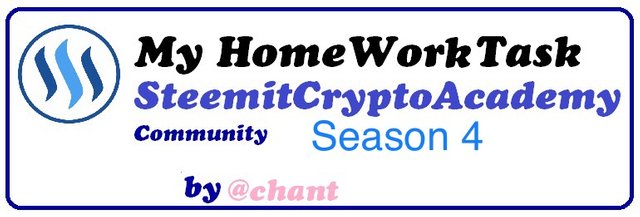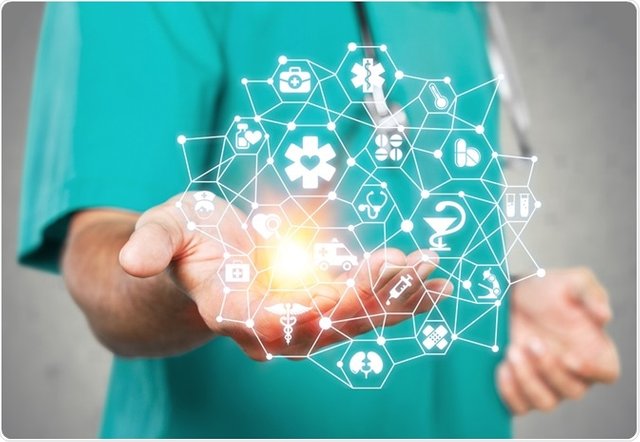Crypto Academy / Season 4 / Week 3 - Homework Post for [Professor @yohan2on]

Research and Discuss the potential applications of Blockchain in the Health care industry
Hello everyone and welcome to week 3 of the season 4 of crypto academy. It is good so far as each week is full of new concepts in crypto-academy. After going through the lecture of our reputable professor @yohan2on on blockchain application in the healthcare system, I am going to present my task below.
Before looking at the application of Blockchain in the health sector, I am going to give a brief understanding of Blockchain technology and show its applicability in the healthcare sector.
Blockchain is a public ledger, decentralised in nature, and have a wide range of features such as transparency, anonymity, data security, use of smart contracts etc that makes the network outstanding. These developments in blockchain has catches the attention of many sectors such as finance, and health sectors. Even though many countries are still to adopt this, some countries such as Estonia adopted it, and 95% of health records are ledger base.
With the numerous good features of Blockchain, I think if incorporated in the health sector, it will improved accessibility, enhanced data security of patients etc. Accessing medical records of patients, and even those of clinicians has been an issue especially in developing countries such as Cameroon. There is no transparency or efficiency in accessing medical records. There is a lot of mixed up with medical records of patients due to the conventional method of keeping records.
Why Blockchain in Healthcare Sector
There are many reasons that makes blockchain outstanding in tackling issues faced by health care sector. The reasons are as follows:
- Blockchain immutable feature where data recorded on the network is unchangeable, makes it difficult for anyone to manipulate data stored on the network. We often hear of medical records swaps, and a patient receiving treatment of a sickness they are not sick of. With blockchain, this will not occur.
- Blockchain and the use of smart contracts will enabled healthcare companies to automate the process of valid claims of medical insurance, and improve on traceability, and safety of drugs.
- It’s decentralised nature, makes it irresistible for healthcare sector. The network does not require any authority to govern the way things are done over the network.
- Blockchain has enhanced security due to encryption with the use of hashes which helps to protect falsified data.
Looking at the features of Blockchain, it is promising to health institutions to incorporate it in the various domains.
Supply chain of drugs by pharmaceuticals:
Blockchain will be useful in this sector as a lot of fake drugs are produce which causes serious health damages to patients. With blockchain immutable feature, pharmaceutical companies can use it to easily trace fake drugs. In developing countries for instance the rate of fake drugs is high. With blockchain, it is easy for governments to trace manufacturers, and distributors, reducing the chances of fake drugs. The distributed ledger of Blockchain will automatically verifies important information for instance a ledger is created for a drug from the laboratory, the ledger continues to record data for the drug until it reaches the consumer. Equally, with COVID-19, many institutions are suffering from acquiring good medical equipments to combat the virus due to the fact that many vendors have broken the supply chain as a result of high demand. There is no equitable consensus between supply and distribution systems making it not transparent. Blockchain can tackle this in a way that organisations, and countries are linked as nodes on a network which will enable fast and timely tracking of quality vaccines.
An example of a use case is blockpharma, a blockchain network that enables patients to determine fake drugs with the help of the SCMApp system.
Secure Patients Data:
Patients data is not supposed to be publicised and only a patients is entitled to his or her medical records unless requested by the doctor or medical personnel for medical follow up. This is because there are some illnesses which required previous medical records for doctor to commence treatment effectively. With conventional methods of keeping data in countries like Cameroon where the doctor had to go through a pile of files to trace patients records. The whole process is time wasted and energy sapping and delays patients treatment. With the adoption of Blockchain technology, it will be time saving, and cost effective to trace patients data as the patient can share his or her public key to the health personnel which the health personnel uses it to decrypt the records and gain access to the data. It’s decentralised feature makes it easy for patients, and healthcare providers to share data safely with no interference from any central authority.
An example of a use case is Medicalchain which protects patients records from being accessed by outsiders. On Medicalchain network, healthcare providers, and laboratories can request for patients records which has a record of origin. Also on this platform, patients can consult with a doctor through video, and then pay with the “Medtoken”.
Blockchain and miscommunication in Healthcare:
In Cameroon, there is a lot of miscommunication between doctors, nurses, and laboratories which at times delays patients care in public hospitals. I can remember one time when I was sick, and went to the hospital due to miscommunication between healthcare providers, my treatment was delayed that almost cost my life. With blockchain, this can be tackled due to the decentralised nature of Blockchain. It permits a single ecosystem of data for a patient which can be accessed easily by doctors, pharmacies, and nurses etc. This will lead to faster diagnosis, and a personalised healthcare plan developed for the patient.
An example of a use case is Robemed which has used blockchain with AI to build a single care point for patients. It helps to store patients records in a more secured way. The data can be shared with patients, and healthcare providers via the use of wearable diagnostic tools, and telemedicine.
Blockchain and Medical Research:
The distributed ledger in blockchain technology enables more data to be stored on the network. This will revolutionise research in Healthcare Sector as more data can be accessed at a reduced cost. For instance in the field of genetics in the past it was more costly for companies to process human genome. With the inception of Blockchain, billions of genetic data can be encrypted and stored safely as a database. This makes it less costly, and easy for scientist to access it.
An example of a use case is Nebula genomics. To resolve the issues of researchers spending billions of dollars in a year to acquire genetic data from middlemen, Nebula uses blockchain distributed ledger to create a database whereby users can sell encrypted genetic data, and it is recorded safely and accessible for scientists to carryout research.
Challenges
Every new development in all sectors has a good side and a bad side, and cannot be fully embraced, Blockchain network is not void of challenges. The challenges faced with blockchain in Healthcare Sector are as follows:
- The major problem is that of data scalability since more data is generated in seconds, storage capacity will be a challenge.
- Some healthcare providers are adamant to change. So changing some of the health care providers behaviours to fully embrace the new technology is a problem especially in less developed countries.
- Lack of standardised management body to implement blockchain to all healthcare sectors. The healthcare sector is a distributed sector. This means that there is no governing body to enforce blockchain in all health institutions.
- Hospitals might not be willing to share data with other healthcare institutions such as insurance companies. These institutions are out to make money. Therefore if forced to share data, patients might end up bearing the burden of the cost as different rates will be imposed on the patients.
Conclusion
Blockchain can transform the healthcare sector with its advancing features. That is transforming a centralised healthcare system to a decentralised system. This will improve on the quality of care provided to patients, and reduced cost of administering healthcare to patients. It will also improve communication between patients and healthcare providers. However, the network has not yet been fully embraced by healthcare institutions.
Nevertheless, blockchain still top the list as the best network that will enabled healthcare sector to enhance quality of service provided.
Thanks to Professor @yohan02 for impacting us with new concepts, and ideas. While waiting for your feedback, remain blessed.

Hi @chant
Thanks for participating in the Steemit Crypto Academy
Feedback
This is average content. Your article was lacking in details regarding the possible application of Blockchain in the Health Care industry.
You need to also learn to format your work in order to make it easily readable.
Total| 5/10